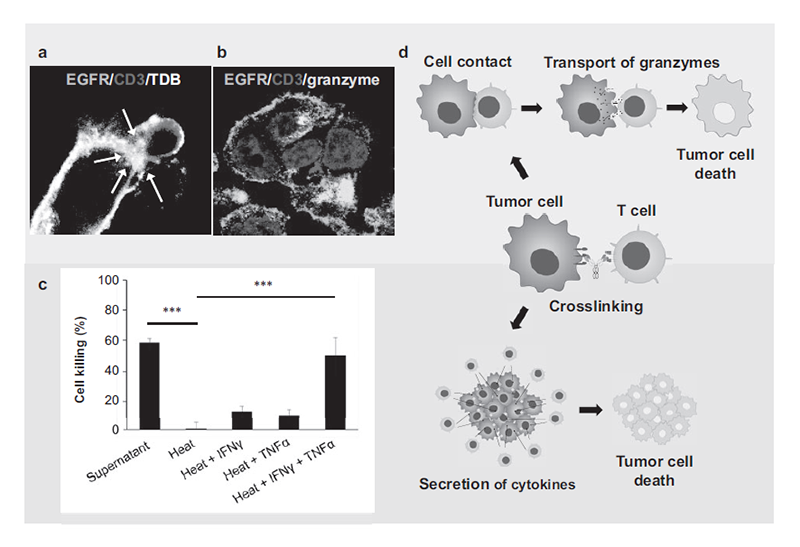Annual Report 2020
Division of Developmental Therapeutics
Masahiro Yasunaga, Yoshikatsu Koga, Hiroki Takashima, Ryo Tsumura, Hirobumi Fuchigami, Takahiro Anzai, Boran Osman, Rumi Fujioka, Chihiro Morizono, Shigehiro Koganemaru, Kenji Takashima, Yusuke Abe, Yu Shibahara, Tamaki Hirakawa, Nozomi Iwata, Daisuke Kamakura, Shiqi Yang, Fang Yu Liu, Mamiko Shimada, Shinji Saijo, Shingo Hanaoka.
Introduction
The Division of Developmental Therapeutics has been involved in basic research on drug delivery systems (DDSs) and antibody therapeutics including monoclonal antibody (mAb) development, antibody-drug conjugates (ADCs), radioimmunotherapy (RIT), bispecific antibodies (BsAbs), and a mAb-conjugated micelle system. We have applied for patents for all mAbs established by our division. In addition, we will aggressively use several cell biology approaches to develop innovative immunoregulation methods to improve the efficacy of antibody drugs in clinics. Furthermore, our advanced mass spectrometry and bioinformatics analysis capabilities can support the effective translation of preclinical research into research involving humans.
The Team and What We Do
- Development of antibody drugs and their derivation to pharmaceutical companies
- Research and development of immunoregulation methods linked to next-generation antibody technology
- Conducting translational research utilizing mass spectrometry
Research activities
1. DDS in Cancer Chemotherapy
Tumor-targeted delivery of therapeutic agents is a longstanding pharmacological goal to improve treatment selectivity and therapeutic index. Most scientists have sought to use “active” receptor-mediated tumor-targeting systems. However, “passive” targeting afforded by the enhanced permeability and retention (EPR) effect provides a versatile and non-saturable approach for tumor-selective delivery. Polymeric micelles are ideally suited to exploit the EPR effect. They have been used for the delivery of various anticancer drugs in preclinical and clinical studies. An anti-TF mAb conjugated to a micelle with epirubicin exerted a potent antitumor effect in a human pancreatic cancer model.
2. Next-generation Antibody Therapeutics
Although clinical applications of antibody therapeutics and next-generation antibody therapeutics centered on ADCs have progressed, they have not been applied to refractory cancers including pancreatic cancer and diffuse gastric cancer. We reported that drug delivery could be disturbed by the dense stroma in such cancers (i.e., the tumor stromal barrier). To overcome the tumor stromal barrier, we are developing novel antibody drugs that can penetrate into tumor cells efficiently. Moreover, molecular imaging allows for the precise evaluation of antibody drugs by visualizing the entire pharmacological process. In addition, refractory or remnant tumor cells themselves are likely to be resistant to general chemotherapy. Alpha-emitters with high-energy and linear-energy transfer, which exert greater cytotoxicity, could be used for the treatment of chemoresistant refractory cancer. Hence, we are pursuing pharmaceutical research and development of ADCs and RIT in collaboration with professionals in various research fields. We are also developing a T cell-dependent bispecific antibody that can eliminate tumor cells independent of MHC engagement; it is expected to be a novel breakthrough immunotherapy against refractory cancer. Currently, two types of mechanisms of action in BsAb treatment have been demonstrated (Figure 1). We have found various cell surface molecules specific to colorectal cancer and created mAbs that correspond to these molecules. An anti-TMEM 180 mAb is being developed for clinical application.
Figure 1. Two types of MOA of BsAb (from the cover of Cancer Immunol. Immunother.)

3. Advanced mass spectrometry and bioinformatics systems
Mass spectrometry studies allow us to visualize payloads released from ADCs and observe the signature of drug-induced cell injury by monitoring changes in biomolecules and metabolites influenced by them. Such approaches would be helpful for elucidating the bystander effect and immunogenic cell death (ICD), which lie at the cutting edge of ADC research. Therefore, we are able to evaluate the mechanism of action (MOA), pharmacokinetics (PK), and pharmacodynamics (PD) of new drugs utilizing advanced mass spectrometry and bioinformatics systems. They are also useful for discovering target molecules for the development of therapeutic antibodies.
Education
1) Doctoral student
Graduate School of Frontier Sciences, the University of Tokyo: one student
Juntendo University: two students
2) Masters students
Graduate School of Frontier Sciences, The University of Tokyo: four students
Future Prospects
We are developing ADCs and RIT as armed therapeutic antibodies against refractory cancers including pancreatic cancer and brain tumors. We will also seek to develop new technologies for strict temporal and spatial regulation of host T cells (T cells as DDSs) through close collaboration with researchers in fields such as DDS development, molecular imaging, protein engineering, gene engineering, and cell biology. Our advanced mass spectrometry and bioinformatics analysis capabilities can support the effective translation of preclinical research into research involving humans. Our cutting-edge research, such as the co-clinical trial project and DDS studies based on nanotechnology, will also promote the development of new drugs through interdisciplinary and industry-academia collaboration.
List of papers published in 2020
Journal
1. Takashima H, Koga Y, Manabe S, Ohnuki K, Tsumura R, Anzai T, Iwata N, Wang Y, Yokokita T, Komori Y, Mori D, Usuda S, Haba H, Fujii H, Matsumura Y, Yasunaga M. Radioimmunotherapy with an (211) At-labeled anti-tissue factor antibody protected by sodium ascorbate. Cancer Sci, 112:1975-1986, 2021
2. Tsumura R, Anzai T, Manabe S, Takashima H, Koga Y, Yasunaga M, Matsumura Y. Antitumor effect of humanized anti?tissue factor antibody?drug conjugate in a model of peritoneal disseminated pancreatic cancer. Oncol Rep, 45:329-336, 2021
3. Kamakura D, Asano R, Kawai H, Yasunaga M. Mechanism of action of a T cell-dependent bispecific antibody as a breakthrough immunotherapy against refractory colorectal cancer with an oncogenic mutation. Cancer Immunol Immunother, 70:177-188, 2021
4. Takashima H, Koga Y, Tsumura R, Yasunaga M, Tsuchiya M, Inoue T, Negishi E, Harada M, Yoshida S, Matsumura Y. Reinforcement of antitumor effect of micelles containing anticancer drugs by binding of an anti-tissue factor antibody without direct cytocidal effects. J Control Release, 323:138-150, 2020
5. Yasunaga M. Antibody therapeutics and immunoregulation in cancer and autoimmune disease. Semin Cancer Biol, 64:1-12, 2020
6. Numasawa K, Hanaoka K, Saito N, Yamaguchi Y, Ikeno T, Echizen H, Yasunaga M, Komatsu T, Ueno T, Miura M, Nagano T, Urano Y. A Fluorescent Probe for Rapid, High-Contrast Visualization of Folate-Receptor-Expressing Tumors In?Vivo. Angew Chem Int Ed Engl, 59:6015-6020, 2020
